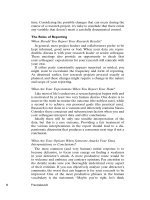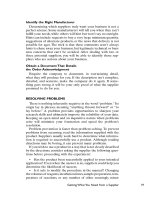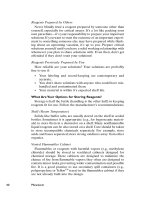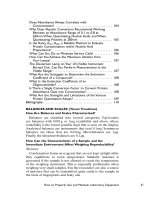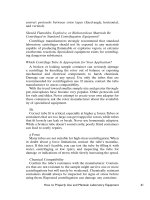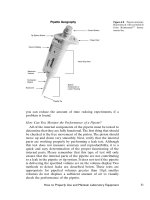Molecular Biology Problem Solver 3 pdf
Bạn đang xem bản rút gọn của tài liệu. Xem và tải ngay bản đầy đủ của tài liệu tại đây (69.59 KB, 10 trang )
time. Considering the possible changes that can occur during the
course of a research project, it’s risky to conclude that there exists
any variable that doesn’t merit a carefully documented control.
The Roles of Reporting
When Should You Report Your Research Results?
In general, most project leaders and collaborators prefer to be
kept informed, good news or bad. When your data are repro-
ducible, discuss it with your research leader or senior colleague.
These meetings also provide an opportunity to check that
your colleagues’ expectations for your research still coincide with
your own.
If either party consistently appears surprised or misled, you
might want to reevaluate the frequency and form of reporting.
As discussed earlier, few research projects proceed exactly as
planned, and these changes might require a change in the nature
and scope of your reporting.
What Are Your Expectations When You Report Your Data?
Like most of life’s endeavors, a research project begins with and
is motivated by at least two very human desires. One desire is to
uncover the truth no matter the outcome (the noblest case), while
a second is to achieve our personal goals (the practical case).
Research is not done in a vacuum and inherently contains biases.
Consider these conscious and subconscious factors when you and
your colleagues interpret data and offer conclusions.
Ideally there will be only one tenable interpretation of the
data, but this is a rare outcome. Providing a fair treatment of
the various interpretations in the report should lead to a dis-
passionate discussion that produces a consensus next step if not a
conclusion.
What Are Your Options When Someone Attacks Your Data,
Interpretations, or Conclusions?
The most common (and very human) initial response is to
become defensive, to focus your energy on finding a weakness
in your detractor’s attack. A more productive route would be
to welcome and embrace any contrary opinions. Pay attention to
the details; make sure you thoroughly understand every aspect
of their criticism. If you can objectively analyze your detractor’s
comments, the worst that can happen is for your research to be
improved. One of the most productive phrases in the human
vocabulary is the statement; “Maybe you’re right, let’s think
8 Franciskovich
about it some more.” Unfortunately, it is also one of the most
underutilized.
THE REWARDS
Money is usually not the sole motivator. The practice of science
requires much patience, a willingness to take risks, and the ability
to wait months or years for the rewards. This requires a special
kind of personal and professional commitment. Why did you
choose to practice science in the first place? Curiosity and awe in
the workings of nature? “Science in the service of knowledge and
society” might elicit chuckles from some within and outside the
scientific community, and that’s a shame.
Hopefully you will find ways to enjoy the scientific process on
a daily level, working to achieve the big things while relishing
small accomplishments. Consider the benefit of recognizing and
rewarding the achievements of others and you, and by all means,
have fun along the way.
BIBLIOGRAPHY
Motulsky, H. 1995. Intuitive Biostatistics. Oxford University Press, New York.
Preparing for Success in the Laboratory 9
11
2
Getting What You Need
from a Supplier
Tom Tyre and Greg Krueger
How Can You Work Most Efficiently With Your Supplier? . . . 12
All Companies Are the Same? . . . . . . . . . . . . . . . . . . . . . . . . . 12
Big Is Better, Small Is Better? . . . . . . . . . . . . . . . . . . . . . . . . . 12
Is the Product Manufactured by the Company That
Sells It? . . . . . . . . . . . . . . . . . . . . . . . . . . . . . . . . . . . . . . . . . 13
Does a Company Test Every Application for a
Product? . . . . . . . . . . . . . . . . . . . . . . . . . . . . . . . . . . . . . . . . . 13
How Well Will the Product Perform? . . . . . . . . . . . . . . . . . . 13
Are Identical Products Manufactured Identically? . . . . . . . . . 14
Will a Company Inform You When They Change the
Product? . . . . . . . . . . . . . . . . . . . . . . . . . . . . . . . . . . . . . . . . . 14
How Can You Work Most Efficiently—and Pleasantly—
with a Sales Representative? . . . . . . . . . . . . . . . . . . . . . . . 14
What Can a Sales Rep Do for You? . . . . . . . . . . . . . . . . . . . . 15
What Should You Expect from a Sales Rep? . . . . . . . . . . . . 15
How Can You Get What You Want from a Sales Rep? . . . . 16
Ordering a Custom Product . . . . . . . . . . . . . . . . . . . . . . . . . . . . 18
Know Exactly What You Need . . . . . . . . . . . . . . . . . . . . . . . . 18
Know Your Quantity Needs and Frequency of Delivery . . . 18
Know Your Spending Limits . . . . . . . . . . . . . . . . . . . . . . . . . . . 18
Document Your Needs . . . . . . . . . . . . . . . . . . . . . . . . . . . . . . 18
Identify the Right Manufacturer . . . . . . . . . . . . . . . . . . . . . . . . 19
Obtain a Document That Details the Order
Acknowledgment . . . . . . . . . . . . . . . . . . . . . . . . . . . . . . . . . . 19
Molecular Biology Problem Solver: A Laboratory Guide. Edited by Alan S. Gerstein
Copyright © 2001 by Wiley-Liss, Inc.
ISBNs: 0-471-37972-7 (Paper); 0-471-22390-5 (Electronic)
Resolving Problems . . . . . . . . . . . . . . . . . . . . . . . . . . . . . . . . . . . . 19
Solving Problems by Yourself . . . . . . . . . . . . . . . . . . . . . . . . . . 20
Example of Using the Six Problem-Solving Steps: The
DNA That Wasn’t There . . . . . . . . . . . . . . . . . . . . . . . . . . . . 23
Solving Problems with the Help of the Supplier . . . . . . . . . 25
Contacting the Supplier . . . . . . . . . . . . . . . . . . . . . . . . . . . . . . 26
HOW CAN YOU WORK MOST EFFICIENTLY
WITH YOUR SUPPLIER?
Companies hire researchers, license ideas, generate much useful
data that aren’t always published, and fund scholarships. Famil-
iarity with the corporate mindset, structure and resources can help
you obtain what you need and avoid problems you don’t want.
All Companies Are the Same?
All companies are not the same, and this fact is becoming truer
everyday. Today a company selling research reagents may consist
of a scientist turned entrepreneur working out of a home office.
From a home in the midwest, the scientist might incorporate in
Delaware. Once set up as a corporation, she may find someone
else to make the wonder reagent in California and then arrange
for some other company to package, label, and distribute the
wonder reagent. No board rooms, no business lunches, and prac-
tically no one for a customer to complain to when things go wrong.
At the other end of the spectrum is a corporation doing business
in 50 countries with sales in the hundreds of millions of dollars. Of
course, with a well-known name on the tip of every scientist’s
tongue and a great reputation, super big company is much easier to
find and much easier to reach for help you need. Don’t count on it.
Each company has its own goals, dreams (i.e., visions) and per-
sonality. Within large companies, each division might have a
distinct philosophy and operating strategy. Satisfaction with
the products and services from an instrument division doesn’t
guarantee similar performance from a reagent division.
Big Is Better, Small Is Better?
Whether Big is better or Small is better depends on whether
they fulfill your needs. Small will often have the greater desire,
since even the smallest amount of business you send to them will
be significant to Small’s bottom line. But it will often lack the
resources, knowledge, or external contacts to fulfill your needs
that are out of the mainstream of its operation. This conflict may
result in Small promising you something it can’t deliver.
12 Tyre and Krueger
Big on the other hand will tend to have access to more internal
and external resources. A special request may be easily within
Big’s knowledge and capacity to deliver. But how much are you
willing to buy? If it isn’t enough, Big won’t have the incentive to
do something unique for you. It just wouldn’t make economic
sense. If Big does its job right, you will quickly know it isn’t willing
to deliver, and you can go looking for another supplier.
Is the Product Manufactured by the Company That Sells It?
Some companies only sell products which they conceive, de-
velop, and manufacture. Other suppliers only distribute products
manufactured by other firms. Many, perhaps most companies, do
some of both.The true manufacturer of a product may not be indi-
cated on a package. If you are satisfied with the product’s perfor-
mance and support, its origin isn’t an issue. But it may become an
issue when problems arise, since the original manufacturer will
generally have the most knowledge about the product.
Does a Company Test Every Application for a Product?
The research community regularly generates novel applications
for commercial products. Combine this with limited application
resources by suppliers, and the result is that a company tests only
those applications it judges most important to the majority of the
research community. If your application isn’t mentioned by the
manufacturer, odds are that application hasn’t been tested or has
been attempted an insignificant number of times.
It never hurts to contact the company. While the company may
not have tested the product in your particular application, your
call might persuade the company to do so. It is not uncommon for
suppliers to provide product at little or no cost in exchange for
application data generated by the customer. Manufacturers also
might have a database of researchers who’ve attempted your
application. The Methods and Reagents bulletin board located in
the Biosci Web site ( is a
productive location to ask if a product has ever been tested in your
particular application.This site can also help you locate and obtain
hard-to-find reagents.
How Well Will the Product Perform?
As alluded to throughout this chapter, it is impossible for a
supplier to guarantee the performance of every product with
every sample source. But in today’s competitive marketplace any
reputable supplier will do its best to guarantee that advertising
Getting What You Need from a Supplier 13
claims match actual performance. In addition third-party review-
ers help ensure advertising claims aren’t overly exaggerated.
These third party (and hopefully objective) reviews of commer-
cial products are provided at the following Web sites:
• The Scientist,
• BIOSCI Methods Group,
/>• Biowire,
• Biocompare,
Are Identical Products Manufactured Identically?
When different companies seem to manufacture identical
items, there may be differences in the production methods. For
example, company A might quantitate the activity of Taq DNA
polymerase after packaging because company A’s automated dis-
pensing equipment might cause foaming of the protein and thus
instability. Alternatively, company B may never test the activity of
the Taq polymerase after packaging because it is manually dis-
pensed, a procedure that doesn’t harm the activity of the enzyme.
The difficulty for you is that switching manufacturers may change
performance more than you expect.
Will a Company Inform You When They Change
the Product?
Manufacturers prefer not to change production strategies, but
sometimes no choice exists: raw materials become unavailable,
broken equipment can’t be replaced, or people leave the company
and take away the knowledge for synthesizing a product.
Changes are not always announced to the public. Responsible
companies try to judge the impact of a change and determine its
effect on the research community, but it is impossible to correctly
predict the impact for everyone. If the change is thought to be sig-
nificant, products might be labeled New and Improved, instructions
might be changed, or packaging might be changed. If you’re not
sure if the changes will affect your research, contact the company
and get the details of the modifications. The manufacturer might
have experimental data that will help you evaluate their impact.
HOW CAN YOU WORK MOST EFFICIENTLY—AND
PLEASANTLY—WITH A SALES REPRESENTATIVE?
The preceding section discussed the inner workings of equip-
ment and reagent manufacturers. The next discussion focuses on
14 Tyre and Krueger
strategies to manage your relationship with a company’s sales rep-
resentative (sales rep).
What Can a Sales Rep Do for You?
A good sales rep can help you determine what you need, what
you don’t need, and the most cost-effective way to get it. As a
conduit to a company’s administrative and scientific resources, a
sales rep can help you resolve bureaucratic problems, receive tech-
nical information in a timely fashion, make sure you clearly under-
stand all the nuances of a price quote, and help you obtain special
order items.
What Should You Expect from a Sales Rep?
While you and your sales rep may think differently, you should
be made to feel confident that advancing your research is impor-
tant to your sales rep. Respect for you and your time, and the
confidentiality of your research should also be maintained. As
discussed below, good salespeople love to know “the inside scoop”
and take personal pride in their customer’s research, but you
shouldn’t have to worry that their exuberance for your work
results in confidential details discussed with your competitors.
The best way to determine a rep’s trustworthiness is to discuss
other work in the field. If you’re suddenly learning details about
the competition that you would never share with the outside world
until papers are published, you have reason to wonder if your
ideas are being similarly discussed. Discussions about what
someone else is buying (unless the researcher has agreed to serve
as a reference) also is cause for concern. You have every right to
expect that even your most mundane dealings with the company
are kept confidential.
Is it reasonable to expect your rep to be thoroughly familiar
with the technical aspects of their products? If they represent a
catalog of 13,000 items, probably not. If the product line is more
limited and highly technical in nature, you should expect a high
degree of technical competence. In either case a good rep
employed by a company that truly cares about their customers
should be able to deliver answers to any questions within two to
three business days.
As is true with business in general, your sales representative is
probably managing her territory by the Pareto principle. That is,
80% of her business comes from 20% of the customers. While the
majority of reps want desperately to assist all customers and treat
them equally, the reality is that the elite 20% are going to get the
Getting What You Need from a Supplier 15
lion’s share of her attention. This is simple survival, as losing all
or part of the business at those key accounts is likely to cost her
significant commissions, and quite possibly her job. This doesn’t
mean that you should ever feel like one of “the-less-than-elite”
80%. You should always feel like the only person in the world
when working with a sales representative, and a cell phone ringing
in a briefcase is not something you should have to deal with.
How Can You Get What You Want from a Sales Rep?
Understand Their Motivation
A sales rep has at his core a rational self-interest. That is, he
must do the things that will benefit his performance and ensure
survival. While some reps are self-centered, others recognize
the interdependent relationship he has with his customers. Your
success is his success, though the converse is not true.
Companies typically motivate their representatives through
sales contests and commission structures. Top salespeople often
receive paid vacations, and commissions are often structured to
move certain product lines. It is true that sales positions are some
of the best paid positions in a company, and most sales people are
to some extent money-motivated. But you still have every right to
expect that products are being offered to you because they will
solve your problem and not because they will make your rep the
most money.
The best salespeople truly enjoy helping others. They enjoy the
bonds that are established, and revel in the feeling that they are
“on the inside” regarding research. At their heart, many sales-
people also have a “need to please,” and they receive a real boost
when they’ve done something for you and you’ve noticed. If you
have criticism, also feel free to relate it, and express your expec-
tation that something be done to improve the situation. While a
poor rep may avoid you once you’ve complained, the good ones
will recognize your comments as an opportunity to change your
opinion of them, their company, and therefore create a satisfied
customer that will likely buy more product.The need to please can
be a great motivational tool to get what you need from your sales
representative.
Manage the Relationship
Evaluating what you need from the company, and how you want
those needs managed will maximize value from the relationship.
Your sales rep doesn’t know what to expect because every cus-
tomer is different. He deals with multiple people at each account:
16 Tyre and Krueger
the researcher, purchasing, receiving, safety, and so on. The rela-
tionship with your sales representative is a lot like dating; it can
be ruined by unexpressed expectations. For that reason it is imper-
ative that you express exactly what you need from this person. Do
you need to see her every week? Do you want to be on the top
of the list for trying new products? Do you simply want to see
them on your terms, that is, “don’t call me, I’ll call you?” There is
nothing wrong with expressing your wants. Rather, you are giving
direction to someone in desperate need of it.
A good sales representative keeps a profile on important cus-
tomers. Items in that profile may include area of research, money
available, general temperment, and if you tell him, exactly how
you like to be handled. Your rep will appreciate this, since it pro-
vides him a chance to better manage your expectations.There may
be ground rules he can’t accept, such as a weekly visit. He may
have distant accounts that will demand his time. Perhaps you can
compromise on an email inquiry along with a bi-weekly visit.
Don’t wait to discuss your needs; tell him on his first visit, reach
compromises if necessary, and start working together.
You’d never dream of running an experiment without proper
controls and measurements, so why treat this vital relationship any
differently? If you’ve laid out your expectations, you now have
the means to evaluate your sales rep. Exceptional sales repre-
sentatives will automatically measure themselves against your
expressed wishes. Feel free to ask for evidence when you review
the relationship. Good sales reps will have an answer ready.
You should expect to review the relationship at some regular
interval. Perhaps your needs have changed, or you’ve noticed
some slippage or improvement in the performance of your rep.
Don’t hesitate to ask for a quick meeting to reassess.
A sales rep can enhance the relationship if she helps you
manage your expectations of the company. She may ask you to
forecast repeat usage or estimate future needs as a way to give
you current information on availability and delivery. If you need
one liter of a reagent, and that volume represents three months’
production for that company, your rep must help you manage your
expectation for immediate delivery.
Leverage
Serving as a reference is a great way to gain influence with your
sales rep.There is no sales tool more powerful than a satisfied cus-
tomer. If you’re happy with your representative, her product, and
the company, offer to serve as a reference. Your sales rep will be
delighted, and this could help get you preferred treatment. Don’t
Getting What You Need from a Supplier 17
hesitate to explain why you’re making this offer, and what you
expect in return. This is part of “negotiating the relationship,” and
you don’t want to make such a generous offer without expecting
something in return.
ORDERING A CUSTOM PRODUCT
A product whose composition or quantity differs from the
catalog item may be considered custom by many manufacturers.
Such specialized items tend to be expensive; the following sug-
gestions are provided to help you obtain the desired item at
minimal cost and aggravation.
Know Exactly What You Need
Vague specifications cause problems. If you call a company and
ask for 100 liters of phosphate buffer at pH 7.5, will it matter how
the pH is adjusted? Does it matter whether sodium or potassium
phosphate is employed?
Complete and detailed communication with the manufacturer
is crucial. You as the buyer must take charge to ensure that the
company tells you what information must be provided, specifi-
cations, and all other details. Ideally a supplier will ask several
detailed, and maybe obvious, questions in order to truly under-
stand your needs. Be suspicious of companies that ask little and
promise everything. Some custom products are simple to specify,
but it might not be feasible to thoroughly describe complex, or
novel, products. In these cases it may be helpful to describe to the
manufacturer what you don’t want as well as what you do.
Know Your Quantity Needs and Frequency of Delivery
Manufacturers can’t determine cost, nor their ability to deliver
the proposed product, without knowing accurate quantity require-
ments and the frequency of orders.
Know Your Spending Limits
Although you do not want to negotiate price immediately with
a manufacturer, you should know what you are willing to pay
for the custom product. This will shorten your list of prospective
manufacturers.
Document Your Needs
A thorough, comprehensive record of your answers to the pre-
ceding questions will prove invaluable during your conversations
with suppliers.
18 Tyre and Krueger



